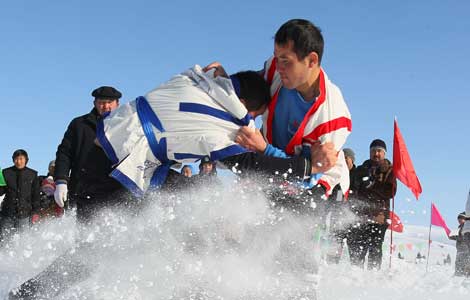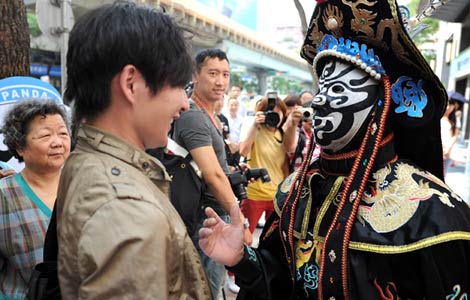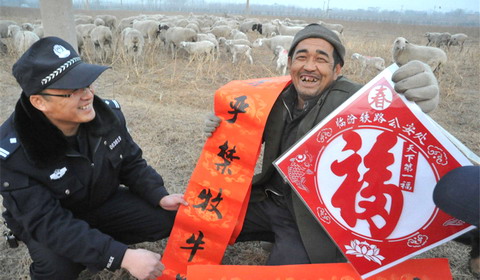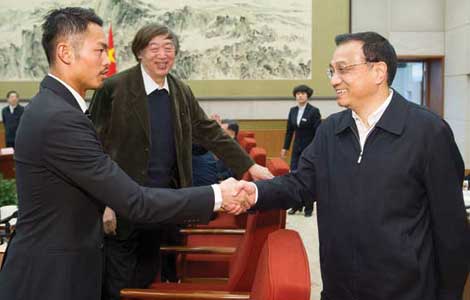Senior US diplomats off to 'quench fire'
Updated: 2014-01-20 11:51
By PU ZHENDONG in Beijing and CHEN WEIHUA in Washington (China Daily USA)
|
||||||||
Washington is dispatching two senior diplomats to East Asia to fine-tune the US pivot to the Asia-Pacific by "quenching the fire" between China and Japan, after recent provocative moves by Tokyo that have further threatened regional stability, observers said.
US Deputy Secretary of State William Burns left Washington on Sunday for the Republic of Korea, China and Japan, while Daniel Russel, assistant secretary of state for East Asian and Pacific affairs, begins a trip to East Asia on Monday.
Burns and Russel will meet in Beijing on Wednesday for bilateral talks with government officials. Russel will separately lead the Asia-Pacific Consultations and hold other bilateral meetings with his Chinese counterparts during his stay, according to the US State Department.
Experts said that mediating strained ties and encouraging dialogue among Beijing, Seoul and Tokyo are at the top of the diplomats' agendas. Washington's increased intervention is an effort to relieve tensions in Northeast Asia, they said.
"The US has been viewing China as a country of global influence and seeking to coordinate with China on a broad range of topics, including the situation on the Korean Peninsula," said Li Haidong, a researcher in American studies at China Foreign Affairs University.
The two US diplomats will try to promote dialogue between Beijing and Tokyo to demonstrate its "positive presence" in the region, but Japan will not be the only issue talked about.
Bonnie Glaser, senior advisor on Asia at the Center for Strategic and International Studies, did not think that Burns and Russel's visits were just over the recent escalation of tension between Japan and its neighbors.
"High-level visits are normal and necessary. There is a long list of issues that our countries are working on together. Meetings help to promote progress," she said.
Glaser believes that North Korea, Iran and South China are all matters of concern to the US and will be on the agenda.
She described the Asia-Pacific Consultations as a very important mechanism when former Assistant Secretary of State for East Asian and Pacific Affairs Kurt Campbell and former Chinese Vice-Foreign Minister Cui Tiankai, now China's ambassador to the US, held them since 2011. It will be the first time for Russel to chair the US side.
"Concerted effort is needed if the Asia Pacific is to become an arena of cooperation between the US and China rather than an arena of zero-sum competition," Glaser said.
Cui and Campbell met for the inaugural China-US Consultations on the Asia-Pacific on June 25, 2011 in Honolulu, Hawaii, as an outcome of the 3rd China-US Strategic and Economic Dialogue to reflect US President Barack Obama and then Chinese President Hu Jintao's commitment to building a positive, cooperative and comprehensive relationship.
In an interview with Charlie Rose aired last Friday, Cui said there is growing consensus on both sides to build a new model relationship that will be free of conflict or confrontation and will focus on cooperation.
"The basis would be much better understanding, mutual confidence and mutual respect," said Cui, who met Burns at the State Department last week.
Jin Canrong, deputy dean at the School of International Studies at Renmin University of China, said Burns and Russel are in the region to "quench the fire" among the Asian neighbors, but strategic confrontation between China and Japan has gone so deep it cannot be resolved simply by diplomatic visits.
"The US will not pick sides in terms of these disputes and therefore the effects of the mission's peacemaking efforts will be limited," Jin said.
Relations between Tokyo and its neighbors have worsened in recent months following the country's policies regarding territorial disputes and Prime Minister Shinzo Abe's Dec 26 visit to the controversial Yasukuni Shrine, which honors 14 Class-A war criminals from World War II.
Li said Beijing's unprecedented anger over Abe's shrine visit, seen in harsh criticism from more than 40 ambassadors, has made Washington reflect on its Japan policy.
"In the past, the US relied on Japan to be a pillar of its rebalancing strategy in the Asia-Pacific without giving enough attention to the country's waking militarism and stubbornness on issues of history," Li said. "Washington had become Tokyo's tool to help meet its own agenda."
Jin said Washington is highly concerned about the development of a China-Japan animosity.
"Opinions about Japan's role in the Asia-Pacific are split in the US,' he said. "The military encourages an assertive Japan, but some legislators are skeptical about it."
On Friday, US President Barack Obama signed into law a spending bill that includes a provision on Japan's wartime sexual enslavement of Asian women.
Xinhua contributed to this story.
Contact the writers at puzhendong@chinadaily.com.cn and chenweihua@chinadailyusa.com.

 Thrillseeker enjoys the hammock in the sky
Thrillseeker enjoys the hammock in the sky
 Babies baptised during a mass ceremony
Babies baptised during a mass ceremony
 Winter cultural festival opens in Xinjiang
Winter cultural festival opens in Xinjiang
 Air travel to Taiwan continues to take off
Air travel to Taiwan continues to take off
 Panda cub in Washington makes her public debut
Panda cub in Washington makes her public debut
 Spring Festival preparations across China
Spring Festival preparations across China
 Premier vows to help startups
Premier vows to help startups
 Obama bans spying on leaders of US allies
Obama bans spying on leaders of US allies
Most Viewed
Editor's Picks

|

|

|

|

|

|
Today's Top News
US honors Martin Luther King Jr.
Human spread of H7N9 'sporadic'
Senior US diplomats off to 'quench fire'
Dropping 'no-war' pledge a part of Abe's strategy
Gang busted for illegal gender selection testing
China software to rival Android, iOS
Xi writes to Chinese in German
Premier vows to help startups
US Weekly

|

|






